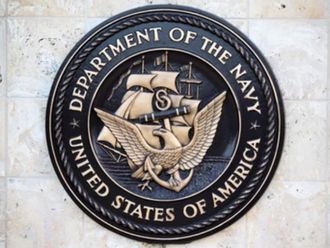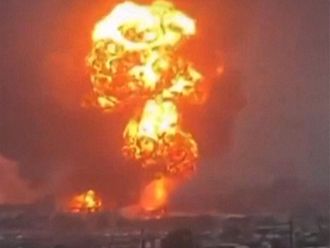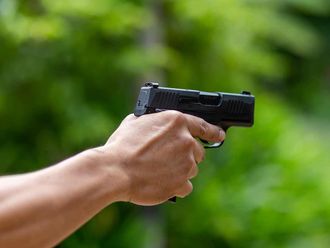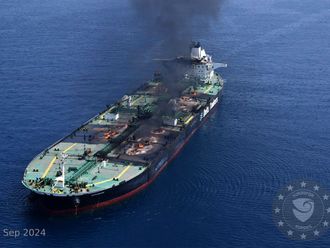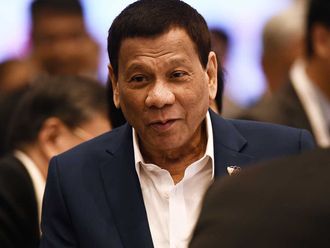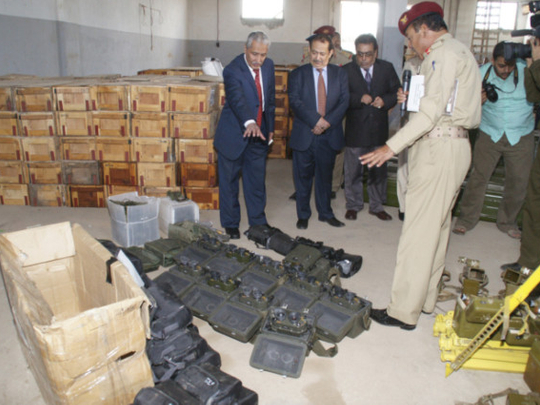
Sana’a: Yemeni President Abd Rabbo Mansour Hadi on Wednesday set March 18 as the date for a much-anticipated national dialogue to push forward the process of political transition, state media said.
Hadi described the conference, which aims to set in motion a process to draft a new constitution and an electoral law for elections in 2014, as a “strategic and historic opportunity... to achieve a civic and modern state,” Saba state news agency said.
The interim president urged Yemeni political forces to “work strongly to make the conference a success, and to grab the historic opportunity to achieve justice, freedom and equality,” Saba added.
It said the decision was announced following a meeting between the president and the committee tasked with preparing for the talks which were originally planned for mid-November.
The conference was delayed after factions in the Southern Movement, which has campaigned for autonomy or secession for the formerly independent south, refused to join the talks.
Hadi was elected last February as part of a Gulf-brokered exit deal that eased former president Ali Abdullah Saleh out of office after 33 years in power, and ended a year of protests against his regime.
The Common Forum parties, which represented the opposition under Saleh and control half of the current government, announced on Tuesday that they will take part in the dialogue.
The Shiite Huthi rebels, who fought the government of Saleh for many years in the north, also said they will participate in the forum.
The position of some southern groups remains vague, but former vice president Ali Salem Al Beidh, who was the president of South Yemen, and who has demanded a full secession from the north, insists on shunning the talks.
The United Nations which backed the Gulf initiative to end Yemen’s crisis has strongly backed president Hadi in his endeavour to implement the political transition and to restructure security forces as stipulated by the peace plan.
A top UN Security Council team, including representatives from the council’s 15 members, visited Sanaa late January to demonstrate the UN’s support to Yemen’s political transition.
Meanwhile, Yemen’s defence ministry revealed on Wednesday that a ship seized last month was found to carry a wide variety of Iranian-made weapons.
They included material for bombs and suicide belts, explosives, Katyusha rockets, surface-to-air missiles, rocket-propelled grenades and large amounts of ammunition.
In a statement, the ministry detailed contents of the Iranian ship seized in Yemen’s territorial waters in mid-January. It described contents as “large, diverse and dangerous” weapons that also included night vision binoculars and goggles, remote devices, circuits, wires and rifle silencers.
Yemen state TV showed Interior Minister Abdul Qader Qahtan and top military officials inspecting the ship, named Jihan 1, docked at Aden port in southern Yemen.
In Washington, US State Department Spokeswoman Victoria Nuland said, “this is obviously extremely troubling.” She added, “we commend the Yemenis on their interdiction’s success.”
The Yemeni news agency reported that Yemen’s coast guard intercepted the ship in an operation coordinated with the US Navy. It said that the vessel’s eight crew members were Yemenis.
Yemen has recently witnessed several cases of illegal arms shipments through its porous shores on the Red and Arabian seas.
Yemen is home to an active branch of Al Qaida, which staged several failed or foiled attacks on US territory over the past several years. Washington considers Al Qaida in the Arabian Peninsula as the terror group’s most dangerous branch.
Yemen’s government, backed by the US, has carried out a wide offensive against Al Qaida strongholds in the south, driving militants out of cities and towns. The militants retaliated with a series of assassinations of top military and security officials in addition to deadly suicide attacks in the capital and in the south.
At the same time, US drone strikes have killed scores of suspected Al Qaida militants.
AP and AFP


